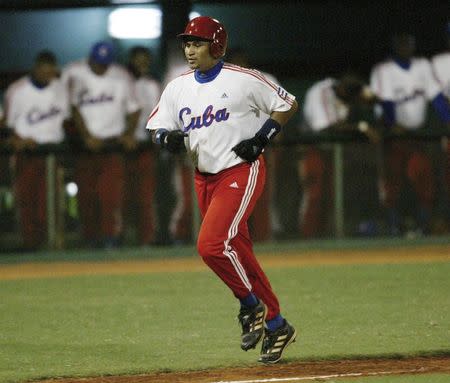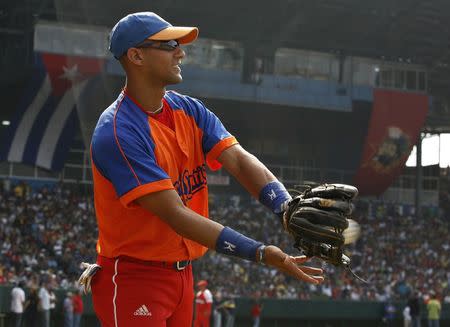Cuba opens pipeline of baseball talent to Japan, U.S. left out
By Daniel Trotta and Junko Fujita HAVANA/TOKYO (Reuters) - Cuba is allowing some of its best baseball players to take their skills to Japan and make good money instead of risking their lives at sea with human traffickers in pursuit of Major League Baseball dreams. The bright lights of the U.S. big leagues do still draw Cuban prospects to speedboats in order to escape the communist-run island - one player just left the island and six others were excluded from the national team for trying. But now they have options. In an attempt to halt defections, Cuba is allowing some of its players to sign overseas contracts while raising the pay of those who stay. Two of Cuba's biggest stars have signed officially sanctioned contracts this season with Nippon Professional Baseball teams, and Cuba for the first time is welcoming foreign scouts. South Koreans have also come looking for Cuban talent. Cuban baseball officials have indicated more signings are likely, though they have not said how many. "We would like to hire more Cuban players in the future," said Masao Shimazaki, director for international relations for the Yomiuri Giants. "One reason Cuba has a lot of good players is because Cuba does not have an agreement with MLB yet." Cuba once prevented its stars from playing in the United States but now Major League Baseball teams are shut out of the Cuban market only because of the decades-old U.S. economic embargo of the country. Without the embargo, they would be free to scout and sign players straight out of Cuba as long as they are willing to share the rights to players with the Cuban government, which also takes a 20 percent cut of the contracts plus income tax. The shakeup in Cuba's rules comes at a time of unprecedented success for Cuban players, as typified by this year's sensation, Jose Abreu of the Chicago White Sox. After defecting last year, Abreu signed a six-year, $68 million contract and deftly adapted to the big leagues. He is among the league leaders in home runs. Since 2009, more than 20 defectors have signed MLB contracts worth a combined total of more than $330 million, according to data on Baseball-Reference.com. Players in the Cuban league were lucky to make $20 a month until recently. Now the minimum salary is over $40 a month, and veteran players can earn several times that. DANGER AT SEA Yasiel Puig defected from Cuba on a speedboat at age 21 and soon found himself entangled with Mexico's notorious Zetas crime organization, which threatened to chop off his arm if it failed to receive the promised $250,000 fee for his passage. When Puig finally reached U.S. shores in 2012, he was rewarded with a seven-year, $42 million contract with the Los Angeles Dodgers. By contrast, Frederich Cepeda is one of Cuba's most accomplished players over the past decade. When the Cuban government finally gave Cepeda his chance to find fortune overseas, he was past his prime at age 34 so he signed a one-year, $1.5 million deal with Japan's Yomiuri Giants. Cepeda was the first to arrive in Japan in April, followed by Yulieski Gourriel, who signed a $900,000 deal with the Yokohama DeNA Baystars in May. Both are veterans who had proven their loyalty to Cuba before being rewarded with the chance to play in Japan. Cepeda said he long wanted to test himself against better competition but chose to wait for a legal option rather than leave behind his wife and 6-year-old son. Defectors also give up any hope of playing for Cuba's national team or returning to play in the Cuban league. They must also wait 8 years before returning as tourists and applying for repatriation. Even so, the United States will continue to appeal to some players. "To be frank with you, there will be players who will defect the country because there are many baseball players in Cuba. All of them cannot sign contracts with foreign teams under this new agreement," Cepeda told Reuters in Tokyo. "So some players will choose to play for MLB. Maybe the number of players who would do that will fall, but I don’t think the number will be zero." Nippon Professional Baseball is a clear beneficiary of the Cuban rule changes, signing players who are off limits to Major League teams because of the U.S. embargo. "That is not our business," said Shigeru Takada, general manager for the Baystars. "All I am saying is that if Gourriel does well in Japan, more good Cuban players will come to Japan." HIGH RISK, HIGH REWARD Puig's ordeal at the hands of the Zetas was first reported in the May edition of Los Angeles Magazine, based on interviews and depositions from a related U.S. court case. The story generated ripples in baseball and some calls for change in U.S. law or Major League rules, but the issue never took hold on Capitol Hill or baseball headquarters. For those who defect, MLB's collective bargaining agreement discourages them from going directly to the United States because that would subject the player to the draft, restricting his salary. So defectors incur more risk by fleeing to a third country in order to become free agents and sign for as much as U.S. teams are willing to pay. For each star like Puig or Abreu, many more defectors labor unceremoniously in the minor leagues, never to sign the big contract nor return to play in Cuba. One veteran Cuban player who recently saw a 21-fold increase in his monthly pay - to $420 - said he never considered taking the dangerous way out, even when he was making $20 a month. "Leaving illegally could cost you your life, although you could become a millionaire," said Carlos Tabares of the Havana team, the Industriales. "In the end you are just merchandise. You can't play with the Mafia." (Additional reporting by Nelson Acosta in Havana and Larry Fine in New York; Editing by Kieran Murray)




